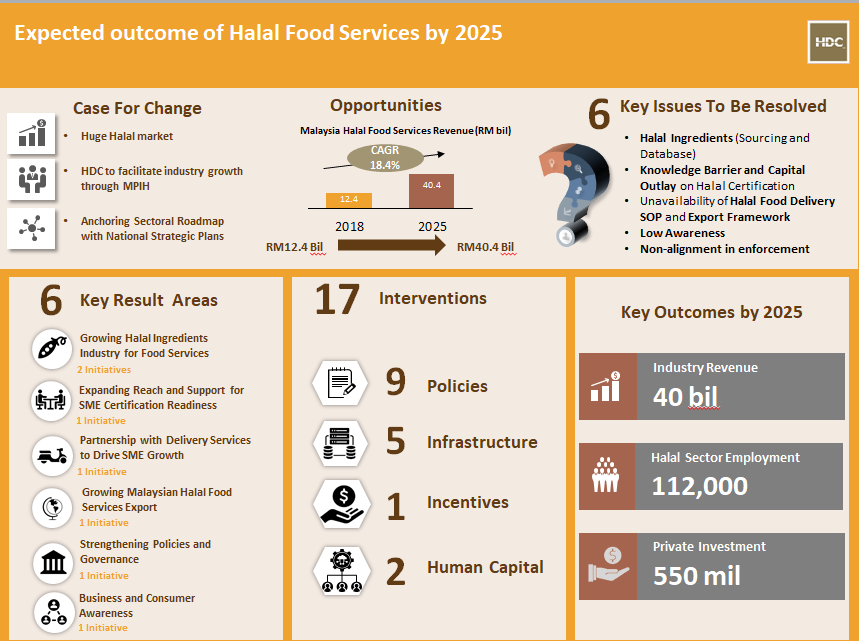
Brief Landscape of Halal Industry (Globally and Domestically)
Demand for Halal products and services are expected to grow exponentially for the foreseeable future.
The Halal industry is expected to grow by USD1.3 trillion in 2018, and is expected to record demand worth USD5 trillion by 2025. The potential of Halal industry alone can go up to USD38 trillion in 2025 globally.
The demand comes not only from traditional OIC countries, but also from emerging regions such as Europe, North Americas and Sub Saharan regions in Africa.
Sectors on demand are mostly from food services, pharmaceutical, tourism, medical tourism, halal ingredients, cosmetics and personal care and medical devices.
Domestically, growth is expected to be positive for the next 9 years. Food services alone is expected to record 11.7% annual growth until 2030. This will be fueled by a few factors, for example, our society moving into a more middle-income bracket and post Covid-19 new norm with the food services delivery businesses expanding to new record highs. Opportunity in Halal food services alone totals RM200 billion by 2025.
HDC’s Perspective on How to Grow the Halal Industry
Malaysia is known as a hub for the Halal Industry and Halal ecosystem due to our strong integrity compliance and Halal certification.
HDC acknowledges opportunities and growth potential in Halal products and services not only domestically but globally.
Our aim is not only to increase certifications, but also to identify key Halal growth sectors, increase private participation and investment, create jobs and produce more local champions (SMEs) in producing Halal products and services to fulfill domestic demand and export.
The other strategic targets for Halal sectors are to encourage more entrepreneurs to come forward, to attract investment in the area of research & development and to foster intelligence and entrepreneurship.
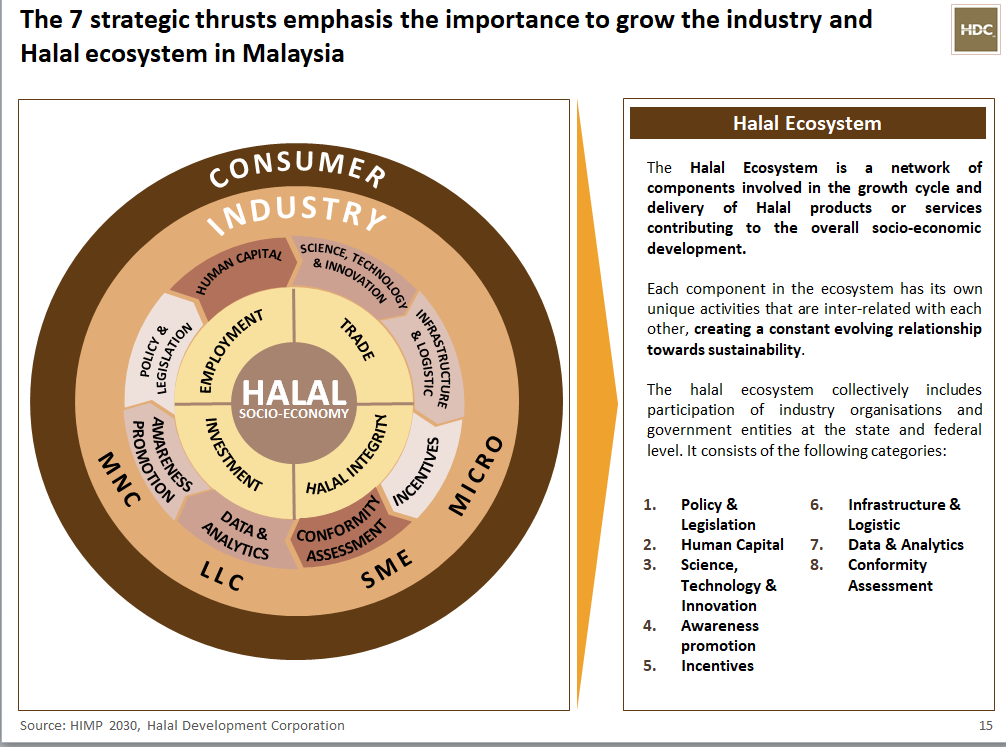
The development of sectoral roadmaps is to provide clarity to grow the industry with detailed action plans and interventions based on the Halal Industry Master Plan 2030 (HIMP 2030) and 12th Malaysia Plan (RMK12). The sectors identified under the HIMP 2030 are divided into two categories:
- Core Sectors: Pharmaceuticals, Food & Beverage and Cosmetics & Personal Care
- Emerging Sectors: Medical Tourism, Medical Devices and Modest Fashion
Key Sectors Targeted by HDC to Grow in the Next 5 Years
At HDC, we took a proactive approach by identifying key Halal Sectors;
- Food services
- Pharmaceuticals
- Halal Ingredients
- Cosmetics and personal care
- Modest fashion
- Medical tourism
- Medical devices
- Muslim friendly hospitality
- Logistics services
- Islamic finance
- Consumer Goods
In 2020, we developed 2 sectoral roadmaps, for Food Services & Pharmaceuticals. These are the two fast-growing sectors, accounting for RM93 billion and RM9.4 billion market size respectively, in Malaysia in 2019.
Each sector will outline its own key challenges and develop specific high impact initiatives and interventions by public sectors.
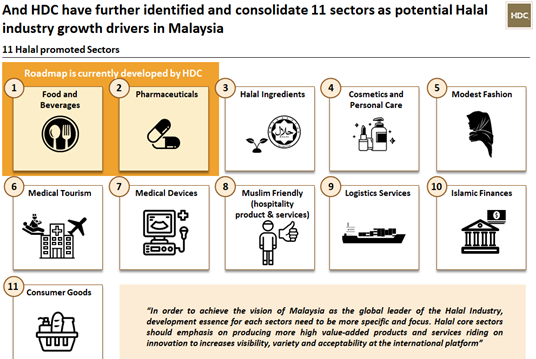
Halal Pharmaceuticals
Halal Pharmaceuticals sector in Malaysia recorded RM3.6 billion market in 2018, driven by an increase in nutraceuticals and over the counter products.
Halal Pharmaceuticals is expected to grow mainly due to increased demand for Halal vaccines and supplements. For example, there is a real opportunity to satisfy a substantial global demand for halal gelatin as currently, only 3% is halal certified. One particular concern to Muslim consumers is that 45% of the 370,000 metric tons produced is porcine gelatin; the remainder is sourced from cows and fish. Production is primarily from non-Islamic countries, with 78% from Europe and the Americas, while the remainder is from China, India, Russia and Southeast Asia. Key players in the halal nutraceutical sector, such as the USA’s Noor Vitamins, are focusing on formulations backed by science to enhance efficacy and consumer trust. Such a move has broadened market appeal beyond the Muslim consumer base.
Key Challenges in Pharmaceuticals
Top of the list is inconsistencies of halal audit & status of ingredients; lack of halal ingredients availability; high capital outlay for facilities; high certification cost and maintenance; and our industry’s own lack of economies of scale.
For example, inconsistencies in halal certification result in confusion for businesses. Whilst Malaysia is the pioneer of MS 2424:2019 which has an advantage, the scientific interpretation of halal recognition is missing, resulting in inconsistencies during halal audits and causes confusion and uncertainty for businesses.
Another example is the industry’s lack of economies of scale; As halal pharmaceuticals can only be recognised for Over The Counter (OTC) and supplements in Malaysia, and many of the export markets do not require halal certification, the market demand is insufficient to justify local production of raw material, thus companies need to rely on importing. The demand in Malaysia is still mainly driven by the public health system, with private and export markets being relatively small. This main demand is also exacerbated by import from MNCs, which have their manufacturing plants overseas and are not required to have halal certification. This is compounded by the fact that MOH does not require the products to be halal, MNCs view halal certification only as an additional burden and have no incentive to seek certification.
4 (four) Halal Key Result Areas (HKRA) with 4 (four) initiatives developed as per the table below. From the initiatives, we have identified 21 interventions that involved policies, infrastructure, incentives and human capital that result in the key outcomes by 2025:-
i) Increase of Revenue to RM 1.62 billion
ii) RM 430 million export created by 2025.
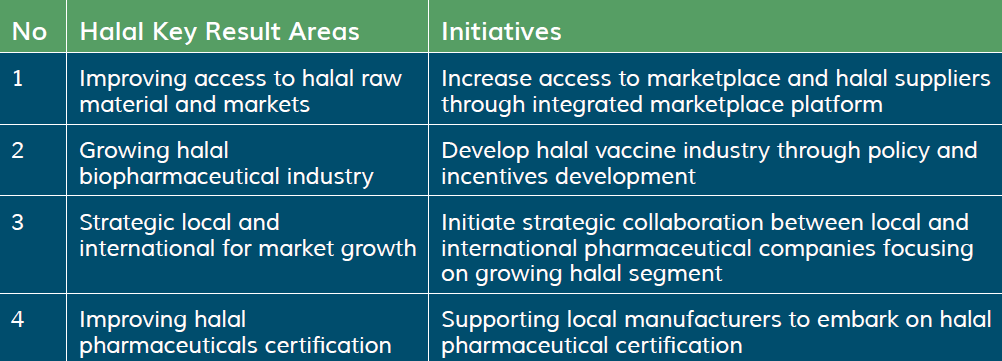
Expected Outcome of Halal Pharmaceuticals by 2025
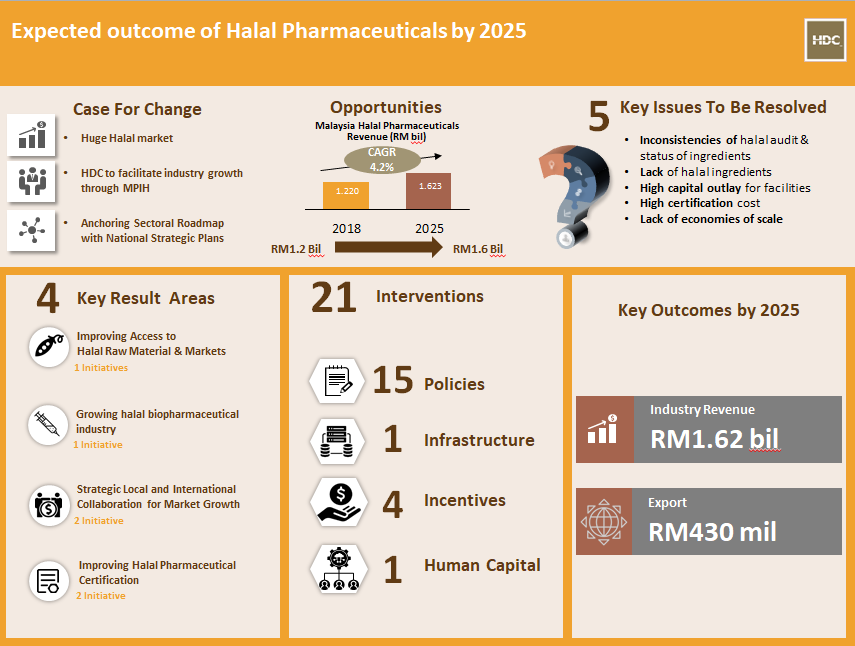
Note: Based on 2018 revenue reported by a selection of listed halal pharmaceutical corporations in Malaysia, excludes non-listed halal pharmaceutical and nutraceutical companies due to lack of existing data. PASB recommends future revision of the target when data becomes available. Assumption of CAGR 4.8% is from HIMP 2030
Halal Food Services
Halal Food Services sector in Malaysia recorded a RM92.5 billion market in 2018. It is expected to grow further driven by increased demand for Food Deliveries and takeaways amid Global Pandemic. The main issues to resolve are Halal Ingredients, awareness of Businesses to undertake Halal certification and policies.
Key Challenges in Food Services
Issues and challenges in food services focus on Halal Ingredients (Sourcing and Database), Knowledge Barrier and Capital Outlay on Halal Certification. Other challenges are unavailability of Halal Food Delivery SOP, Export Framework and low Awareness of Halal certification.
Example of Halal ingredients - For a food product to be halal for consumption, there is a need to ensure that the food is halal all throughout the food supply chain and this is not an easy process. Starting from the raw materials, meat and meat-related ingredients have always received the biggest attention. There are many recent cases that have been brought to the public attention regarding fraud on meat products. There are a number of reported incidences whereby meat that is labelled, certified, or sold as halal may not be so.
For food delivery SOP, we know in the new norm, it is a booming industry. Hence the need to have Halal delivery standards. The standard for delivery food services is non-existence. The current certification scheme is intended for a full-fledged logistics company. It would be ideal to have a new scheme fitting the operating model of online platforms.
6 (six) Halal Key Result Areas (HKRA) with 7 (seven) initiatives developed as per the table below. From the initiatives, we have identified 17 interventions that involved policies, infrastructure, incentives and human capital that result in the key outcomes by 2025:-
- Increase of revenue to RM 40 billion
- 112,000 halal employment created
- Investment of RM 550 million
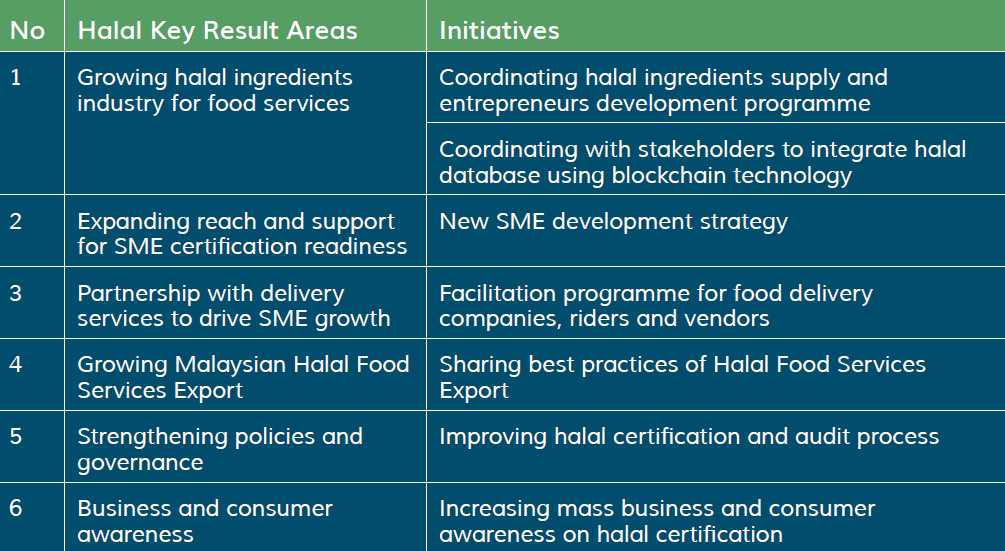
Expected Outcome of Halal Services by 2025
